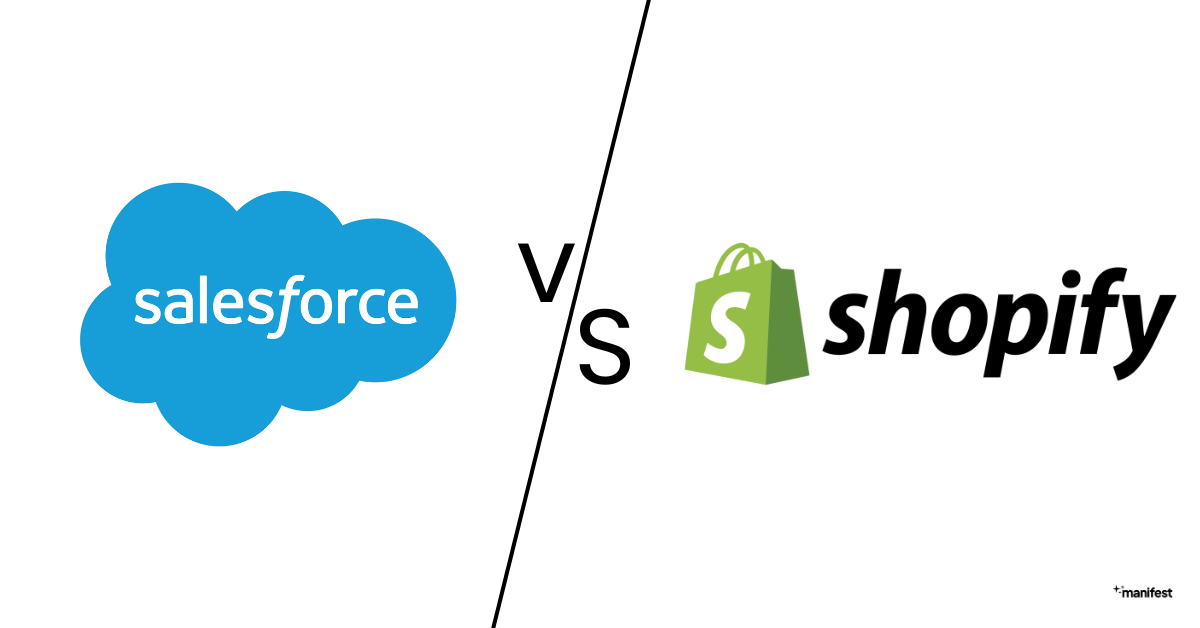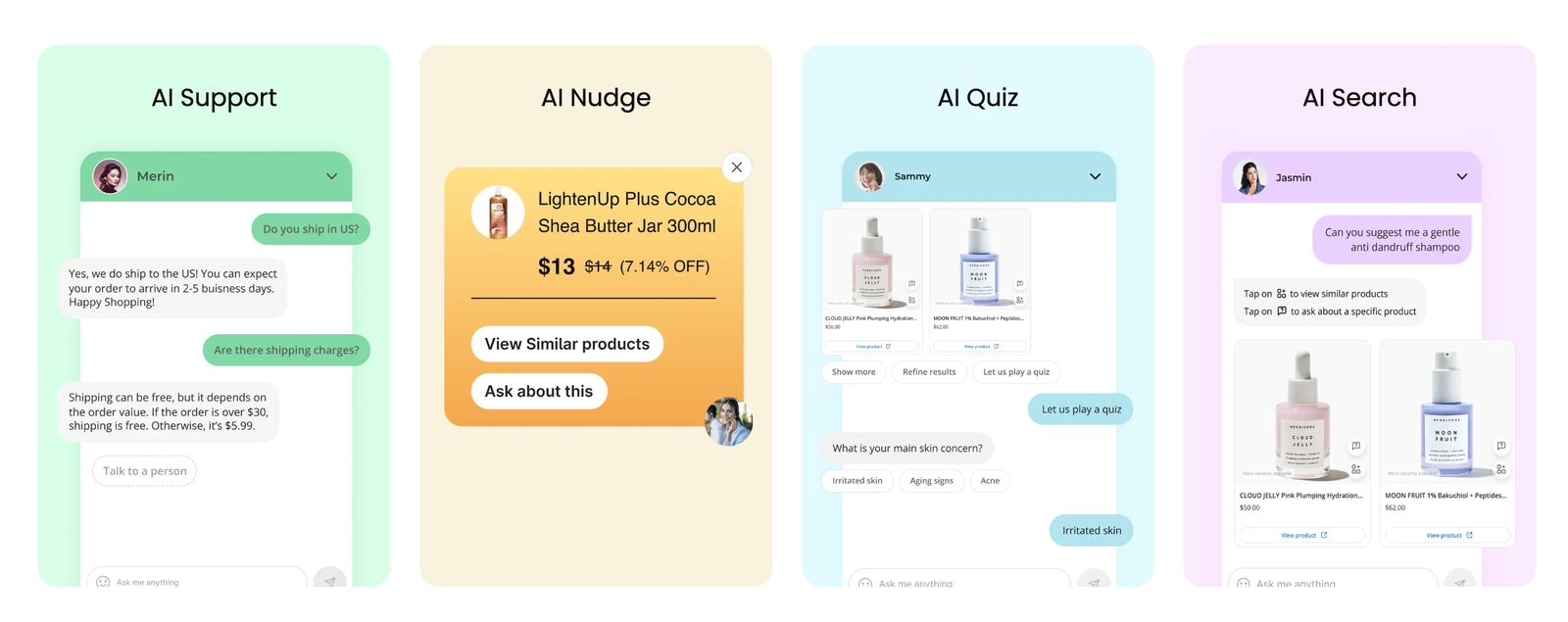Salesforce Vs Shopify: Which Platform Is Best For Online Businesses

Selecting the appropriate platform for your internet business is essential to its success. Salesforce and Shopify, two strong competitors, address distinct needs. This blog explores the advantages and disadvantages of each, guiding you through the features, costs, and applicability of Salesforce vs. Shopify for your particular online project. Whether you're a seasoned business owner or a novice entrepreneur, this comparison will provide you with the information you need about Shopify and Salesforce to make a wise choice and grow your online store.
Salesforce Vs Shopify: Overview
Let's start the comparison of Shopify vs Salesforce by their overviews;
Salesforce Overview

Salesforce is a cloud-based customer relationship management (CRM) platform that offers a comprehensive suite of tools for managing sales, customer service, marketing, and more. It helps businesses streamline their processes, enhance collaboration, and gain insights through analytics, ultimately fostering stronger customer relationships.
Shopify Overview

Shopify is an e-commerce platform that enables businesses to create and manage online stores with ease. It provides a user-friendly interface, customizable templates, and a range of features for inventory management, payment processing, and order fulfillment. Shopify empowers entrepreneurs and businesses to establish a strong online presence and effectively sell products or services across various channels.
Salesforce Vs Shopify: Features
Here is the difference of features in Salesforce Vs. Shopify:
Salesforce Features
Comprehensive CRM Tools: Salesforce provides a robust set of customer relationship management tools, including lead and opportunity management, contact tracking, and collaboration features to streamline sales processes.
Customization and Automation: Users can customize Salesforce to suit their specific needs and automate various workflows, reducing manual tasks and improving efficiency.
Analytics and Reporting: The platform offers powerful analytics tools for tracking sales performance, customer behaviorand , and other key metrics, helping businesses make data-driven decisions.
Integration Capabilities: Salesforce seamlessly integrates with a wide range of third-party applications and services, enhancing its functionality and allowing for a more connected business ecosystem.
Scalability: Suitable for businesses of all sizes, Salesforce scales to accommodate growing needs, making it a versatile solution for enterprises with varying complexities.
Shopify Features
E-commerce Store Creation: Shopify simplifies the process of building and customizing online stores, offering a variety of templates and a user-friendly interface.
Payment Processing: The platform facilitates secure online transactions by supporting multiple payment gateways, ensuring a seamless checkout experience for customers.
Inventory Management: Shopify includes tools for managing product listings, tracking inventory levels, and handling order fulfillment, providing a centralized system for e-commerce operations.
Multi-Channel Selling: Businesses can sell products not only through their online store but also across various channels, such as social media and online marketplaces, expanding their reach.
App Store: Shopify's extensive App Store offers a wide array of apps and integrations to enhance functionality, allowing users to add features like marketing tools, analytics, and customer support solutions to their store.
Shopify vs WordPress: Which One Is Better?
Salesforce Vs Shopify: Pricing
Choosing the right ecommerce platform boils down to more than just features, and pricing plays a crucial role. Let's see Salesforce, and Shopify Pricing compare in terms of their cost structures:
Salesforce Commerce Pricing

Shopify Pricing

Salesforce Vs Shopify: Review (Pros & Cons)
Here's a breakdown of the key pros and cons of both Salesforce and Shopify:
Shopify Pros & Cons
Pros
- User-friendly: Designed with ease of use in mind, ideal for beginners with limited technical knowledge.
- Cost-effective: Transparent pricing plans with predictable monthly fees, making it suitable for budget-conscious businesses.
- Scalable: Offers tiered plans and app integrations that can grow alongside your business.
- Wide range of themes and apps: The extensive app store provides solutions for various functionalities, enhancing your store's capabilities.
- Strong security and reliability: Robust infrastructure ensures secure transactions and minimal downtime.
Cons
- Limited customization: Offers less flexibility than Salesforce for unique store designs and functionalities.
- Transaction fees: Lower-tier plans incur additional fees per sale, impacting profit margins.
- Features may not scale: While scalable, certain features might not be suitable for large businesses with complex needs.
Salesforce Pros & Cons
Pros
- Highly customizable: Offers extensive customization options for building unique and complex online stores.
- Powerful features: Advanced functionalities for managing large product catalogs, complex promotions, and B2B commerce.
- Scalability: Designed to handle high traffic volumes and support the growth of large businesses.
- Integrations: Integrates seamlessly with other Salesforce solutions, fostering a unified customer experience.
Cons
- Steeper learning curve: Requires more technical expertise compared to Shopify, potentially requiring additional resources or training.
- Higher cost: Opaque pricing structure with potentially significant costs based on custom quotes, making it less suitable for budget-conscious businesses.
- Complexity: Feature-rich nature might be overwhelming for smaller businesses with simpler needs.
Shopify vs GoDaddy: Which is Best for Your E-commerce Business in 2024
Is Shopify and Salesforce Integration Possible?
Yes, integration between Shopify and Salesforce is possible!
Here are some ways to add Salesforce to Shopify:
Third-party integration tools
- Zapier: Offers pre-built templates to automate workflows between various applications, including Shopify, Salesforce integration. You can connect your accounts and create "Zaps" to perform actions like creating Salesforce leads for new Shopify customers or updating Salesforce records with new Shopify orders.
- Skyvia: This cloud-based platform allows seamless integration without requiring code. It offers real-time data synchronization between Shopify and Salesforce, streamlining inventory management and customer data management.
Native API tools
Both Shopify and Salesforce offer APIs (Application Programming Interfaces) that allow developers to build custom integrations. This approach provides more flexibility and control but requires technical expertise or hiring a developer.
App solutions
Shopify App Store: Several apps in the Shopify App Store facilitate integration with Salesforce. These apps often offer user-friendly interfaces and pre-configured settings, making them suitable for businesses without technical knowledge.
Salesforce AppExchange: Similarly, the Salesforce AppExchange offers apps like "Shopify made easy" that streamline the integration process and provide a unified platform to manage your Shopify and Salesforce data.
Shopify vs Amazon: Which Ecommerce Platform is Right for You in 2024
How To Migrate From Salesforce To Shopify Plus?
Migrating from Salesforce Commerce Cloud to Shopify Plus involves several critical steps:
Planning and Preparation
Define your goals: Clearly outline what you hope to achieve with the salesforce to shopify migration, such as improved user experience, cost reduction, or increased sales.
Evaluate your data: Assess the type and volume of data you need to migrate, including product information, customer details, order history, and marketing data.
Choose a migration strategy: Decide on your preferred approach, such as self-migration using tools and resources, or partnering with a migration specialist or Shopify Plus agency.
Data Extraction and Transformation
Data Extraction from Salesforce: Utilize export tools or APIs to extract relevant data from your Salesforce instance.
Data transformation: Cleanse and format the extracted data to ensure compatibility with Shopify Plus's data structure. This might involve mapping fields, handling duplicates, and ensuring data accuracy.
Data Import and Setup
Import data into Shopify Plus: Utilize Shopify Plus import tools or partner services to import the transformed data into your new store.
Store setup: Configure your Shopify Plus store, including product pages, payment gateways, shipping settings, and taxes.
Testing and Launch
Rigorous testing: Thoroughly test all functionalities, including product details, shopping cart, checkout process, order fulfillment, and data integrity.
Soft launch: Consider a soft launch to a limited audience to identify and address any potential issues before a full-scale launch.
Grow your Shopify Store with AI

Elevating your Shopify store's performance and customer experience can be achieved seamlessly with the integration of Manifest AI. This AI-driven tool specializes in enhancing your online store by automating interactions and personalizing the shopping journey for each visitor.
Features Explained:
- Automated Customer Interaction: Manifest AI provides immediate, automated responses to customer inquiries, ensuring your customers receive prompt assistance without delay. This feature significantly improves response times and overall customer satisfaction.
- Personalized Recommendations: By analyzing customer behavior and preferences, Manifest AI tailors product suggestions to match each customer's interests, increasing the likelihood of purchases and boosting sales.
- Enhanced Search Functionality: The tool improves your store's search capabilities, allowing customers to find exactly what they're looking for with ease. This leads to a smoother shopping experience and reduces bounce rates.
- Interactive Quizzes: Manifest AI can engage customers with quizzes to better understand their preferences, enabling more accurate product recommendations and enhancing the personal connection with your brand.
Conclusion
To sum up, Shopify and Salesforce both provide strong online business solutions, but they serve different purposes. Shopify excels in terms of price, scalability, and ease of use for small and medium-sized enterprises. On the other hand, Salesforce Commerce Cloud gives big enterprises access to sophisticated capabilities, vast customization, and seamless connection with other Salesforce products. The "best" platform ultimately depends on your particular business's size, spending limit, level of technical skill, and required features. To advance your online business, carefully consider your needs and the advantages and disadvantages of each platform before deciding which one to use.

.png)
